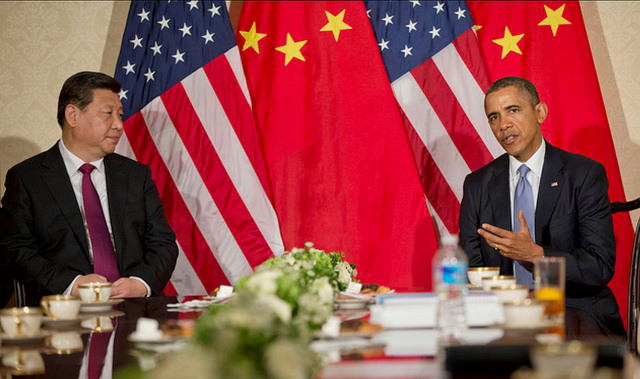Strategic is what we make of it
Posted By Andrew Carr on March 23, 2015 @ 14:30
In the 1990s, an American scholar wrote a famous paper called ‘Anarchy is what states make of it’. The central argument was that little in international politics is pre-ordained and how we think about issues defines how we respond to them.
A long line of thinkers from Thomas Hobbes in 1651 to Kenneth Waltz over 300 years later had argued that international politics was defined by anarchy. As a natural and inevitable result states had to act in a particularly ‘realist’ way. But noted Alexander Wendt [2], ‘self-help and power politics do not follow either logically or causally from anarchy and that if today we find ourselves in a self-help world, this is due to process, not structure’.
In short, there was nothing ‘natural’ about the so-called state of nature or inevitable about how we had to respond to this problem. It seems to me a similar question of underlying assumptions can be raised around the use of the word ‘strategic’ today, particularly in the debates about China’s new Asian Infrastructure Investment Bank.
If strategic concerns are political decisions around the use of force [3], it’s hard to see an inevitable or natural link from this proposed bank to a changing calculus in the region.
First, there’s no great evidence that countries choose their friends and allies simply because of cheap loans. As a wealth of Cold War experience showed us, many countries happily took money from both sides then acted on the basis of their own national interests.
Or to look at it a different way, few would argue that Washington’s preferred economic institutions such as the IMF are the basis of its influence and role in the region. Those organisations help (and at other times hinder) but are part of a much wider set of forces that support US predominance.
Likewise the AIIB will be far from the only source of loans in the region. While loans might be easier to get from there, and perhaps on terms more indulgent than those of, say, the IMF, the countries of the region have real choice, thus denying China substantial leverage.
Nor is the AIIB the only Chinese or regional initiative that doesn’t bear Washington’s fingerprints. The lazy notion that Asia’s regional order was ‘built’ by the US ignores the immense variety of forums, institutions, and formal and informal agreements and compacts that make the region function today. As Evelyn Goh has pointed out in her excellent book The Struggle for Order [4], it’s precisely America’s willingness to negotiate those regional impulses that has enabled much of its post-cold war authority.
Finally, it’s worth remembering the region is becoming much wealthier and more capable. Sure, China is now the big dog, but this is a region that can stand on its own feet. Loans will help, but their absence or restriction will not stop the immense demographic and technological forces shaping this region and, indeed, the world. The region is full of countries who have clear ideas about their national interests, growing power to defend them, and a desire to remain independent and free to pursue those interests.
It’s therefore hard to see how the AIIB will have any significant impact on decisions around either regional alignment or the use of force by countries in the Asia-Pacific.
Indeed, it seems to me that the only way China’s AIIB is a ‘strategic’ concern is—ironically—through our willingness to consider it as such. We have treated it as a contest for influence and so made it one.
The Obama administration’s ham-fisted effort to prevent other countries from joining the AIIB, and attacks on friends when they do, suggests that Washington sees this as a zero-sum type competition. And regardless of the on-the-ground reality I’ve just laid out, perceptions about who ‘wins’ and who ‘loses’ go a long way to determining choices about which way the region is shifting.
That’s not to dismiss the economic and governance concerns some have about the AIIB. Nor to assume we can sit back and watch China try and replace every institution in the region with one it owns. But concerns about ‘strategic’ influence seem based on a zero-sum notion that is more assumed than automatic.
Rather, I would argue that to the extent the US and allies like Australia are willing to incorporate proposals for change by Beijing (or New Delhi for that matter), the better placed they will be to control its effect. To the extent they see any change as an automatic ‘strategic’ challenge, the more likely that view will take hold and the more expensive and difficult it will be to sustain US leadership.
Andrew Carr is a Research Fellow in the Strategic & Defence Studies Centre, Australian National University. Image courtesy of Flickr user U.S. Embassy The Hague [5].
Article printed from The Strategist: https://www.aspistrategist.org.au
URL to article: https://www.aspistrategist.org.au/strategic-is-what-we-make-of-it/
URLs in this post:
[1] Image: http://www.aspistrategist.org.au/wp-content/uploads/2015/03/13756957204_28815235be_z.jpg
[2] noted Alexander Wendt: https://ic.ucsc.edu/~rlipsch/Pol272/Wendt.Anarch.pdf
[3] political decisions around the use of force: http://www.aspistrategist.org.au/the-lost-meaning-of-strategy/
[4] The Struggle for Order: http://ukcatalogue.oup.com/product/9780199599363.do
[5] U.S. Embassy The Hague: https://www.flickr.com/photos/usembassythehague/13756957204/in/photolist-mmjWD7-btKUp4-eXsijw-q7oao7-btKUyr-btKUbx-q5Fped-bvcStg-qVkcx6-btKTNg-g2Exer-bvcSnR-bvcSDz-bvcSEK-mXE16j-btbtRn-eHuows-dTa1o8-bvcSvP-bvcSqK-dTfCcU-dTa1pM-bv3abV-mofsAu-f6hrL7-dTfCd1-bvcSC8-dTa1on-pQd1EE-f63boZ-f63a4F-f6hqsd-f6hqtS-f6hqPY-f63aJ6-f6hrby-f63aag-f639Z2-f63b4k-f6hrWy-f63bwK-f6hrwh-f6hqFU-f63aoM-f6hs13-f6hrZ5-f63aKP-f6hrxG-f63b9p-f63a18
Click here to print.
